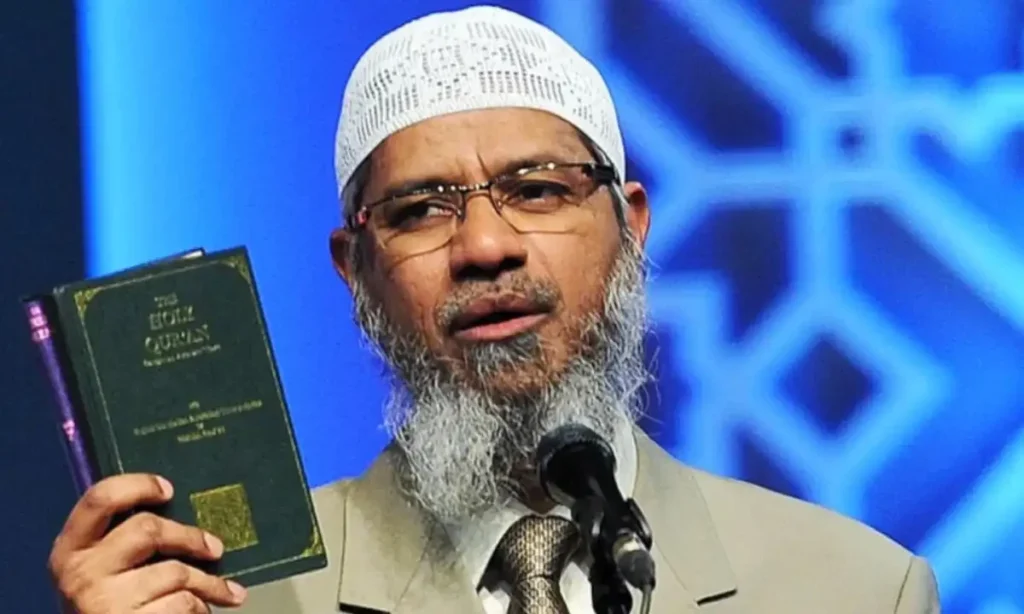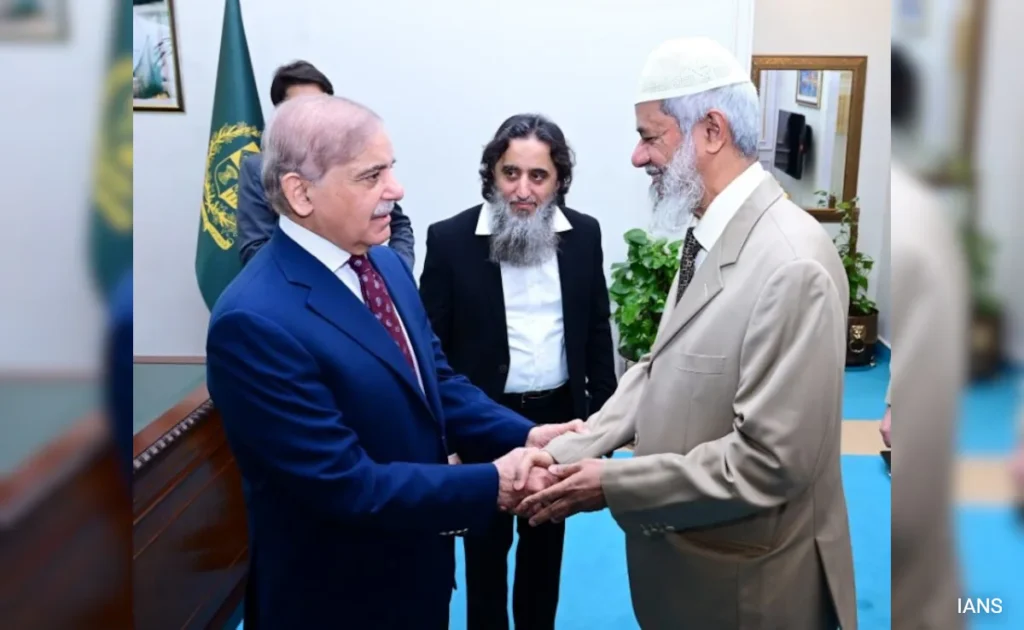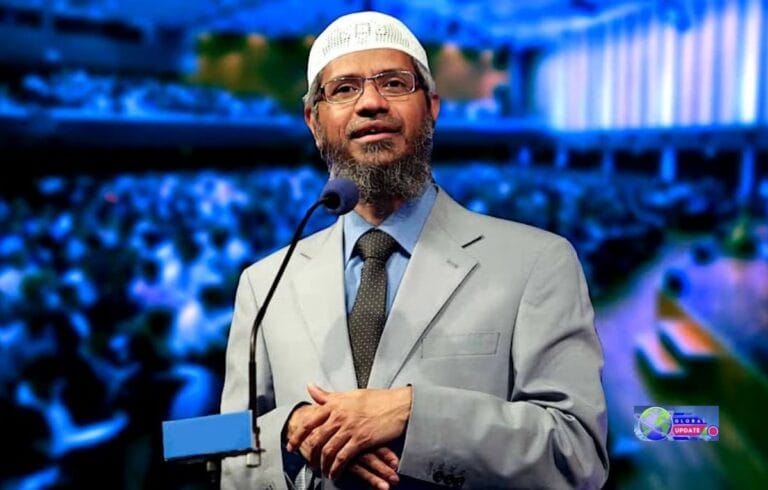Joyfully Returns to Pakistan After 33 Years.
LAHORE: To solve society’s problems, renowned Islamic scholar Dr. Zakir Naik has called on Muslims everywhere to unite and steadfastly uphold the principles of the Quran and Sunnah.
Dr. Naik underlined his expertise in bringing non-Muslims to Islam, stating that his purpose is to disseminate the word of Islam in a broad, inclusive manner.
In a significant event that drew the attention of religious scholars, political leaders, and laymen alike, Dr. Zakir Naik, a renowned Islamic preacher and orator, called for unity among Muslims during his return to Pakistan after 33 years.
Dr. Naik, known for his dynamic speeches and deep understanding of comparative religion, expressed profound joy at returning to a country he holds dear. His return was not merely a homecoming but a spiritual and symbolic moment, as he urged the Muslim community to overcome divisions and embrace a unified path grounded in the teachings of Islam.
A Welcome Return After Decades
Dr. Zakir Naik’s return to Pakistan after over thirty years was historic. His final visit in the early 1990s made a deep impression on many people. Still, since then, he has remained physically absent, even as his influence permeated the media and public discourse.
The long absence was mainly due to his extensive global travels and his role as a speaker at international conferences, debates, and religious forums. However, it was clear from his reception that his presence had been sorely missed in Pakistan.

Arriving in Pakistan, Dr. Naik was greeted by a large crowd of admirers and followers at the airport, including prominent political and religious leaders who had long anticipated his visit.
His return comes at a crucial time, with Pakistan and much of the Muslim world grappling with numerous internal and external challenges, including sectarian tensions, political instability, and ideological divisions.
A Message of Unity
During his address to a packed audience, Dr. Naik’s primary focus was on the necessity for unity among Muslims.
“The Muslim Ummah is like one body,” he remarked, quoting from the teachings of Prophet Muhammad (PBUH). “When one part of the body suffers, the entire body feels the pain. Today, Muslims are divided by sectarianism, nationalism, and other superficial differences, but we must remember that we are one in our faith and devotion to Allah.”
He further elaborated on how Islam, as a religion, promotes peace, tolerance, and brotherhood among its followers. “Islam does not teach us to divide ourselves into factions or groups.
We must rise above the petty differences of sect and ideology. Our strength lies in our unity, in following the Quran and the Sunnah.
This message resonated deeply with his audience, many of whom acknowledged that disunity within the Muslim world has led to unnecessary conflicts and has been exploited by external forces to weaken the global Muslim community.
Zakir Naik’s call for unity was timely and much-needed. Across many Muslim-majority nations, political rivalries and sectarian disputes have often spiraled into violence, tearing apart communities and weakening the fabric of society.
Dr. Naik emphasized the importance of coming together on shared principles, highlighting that the core values of Islam—such as justice, equality, and compassion—transcend any sectarian or political differences. He urged Muslims to focus on their commonalities rather than their differences, calling for dialogue, mutual respect, and understanding.
Reaffirming Pakistan’s Role in the Muslim World
Dr. Naik also acknowledged Pakistan’s strategic and spiritual importance within the broader Muslim world in his speech. “Pakistan is a nation with immense potential,” he stated. It is rich in culture, history, and adherence to Islamic values.
The people of Pakistan have always shown great love for their religion, and I believe that this country can play a crucial role in uniting the Muslim Ummah.
His words resonated with many Pakistanis who see their country not just as a political entity but as a spiritual bastion of Islamic principles.
He expressed gratitude to the people of Pakistan for their steadfast faith and fortitude in the face of hardship. Naik also encouraged Pakistan to continue mediating conflicts within the Muslim world and working towards solutions promoting peace and harmony.
The Challenges Ahead
While Dr. Naik’s call for unity met with widespread enthusiasm, he did not hesitate to address the challenges facing the Muslim world. From sectarian violence in the Middle East to ideological differences in South Asia, various political interests, both internal and external, have exploited the divisions within the global Muslim community.
He warned that these divisions weaken the Muslim world and detract from the shared goal of upholding Islamic values.
“Unity is not an easy goal,” Dr. Naik admitted. “It necessitates work, sacrifice, and a readiness to set aside our egos and individual goals. But if we truly want to walk the path of Islam, we must work. We must work towards healing the rifts within our community, whether sectarian, ethnic, or nationalistic.”
He also discussed the value of knowledge and education in promoting harmony. The Quran emphasizes the significance of pursuing knowledge numerous times. We must educate ourselves about our religion, the world, and each other. Ignorance breeds misunderstanding, and misunderstanding breeds division.
Personal Reflections and Future Plans
Dr. Zakir Naik also took a moment to reflect on his journey and the joy he felt upon returning to Pakistan. “It has been 33 years, but my admiration for this nation has not wavered. I have always felt a deep connection to Pakistan and its people. I am overjoyed to be back, and I hope my visit will help inspire a renewed commitment to unity among Muslims here.”
During his stay in Pakistan, Zakir Naik intended to engage with various religious and political leaders, hoping to foster dialogue and cooperation. He also hinted at future collaborations with Pakistani educational institutions to promote Islamic education and interfaith dialogue, which he believes are critical to building a more harmonious society.
Dr. Naik also encouraged students to learn Arabic to comprehend Islamic teachings better, emphasizing the importance of the Muslim community’s cooperation for progress.

Dr. Zakir Naik met with Pakistan Muslim League (N) President Muhammad Shehbaz Sharif. Shehbaz Sharif recognized and praised Dr. Naik’s substantial contributions to Islamic teaching during the encounter. The debate was held pleasantly, with both leaders exchanging perspectives on religious and social issues.
Conclusion
Zakir Naik’s return to Pakistan marked by a powerful message of unity, peace, and brotherhood. His call for Muslims to come together and rise above their differences struck a chord with many, offering hope for a future where the Muslim Ummah can stand firm and united.
His visit not only rekindled the admiration many Pakistanis hold for him but also reminded the global Muslim community of the importance of unity in the face of growing challenges.



